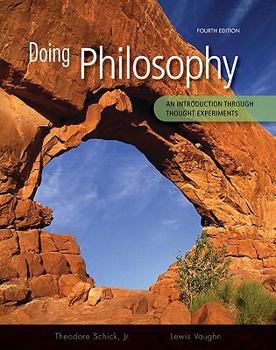Doing Philosophy: An Introduction Through Thought Experiments
Select Format
Select Condition 
Book Overview
Doing philosophy inspires active learning and helps students become more accomplished critical thinkers by encouraging them to reflect on philosophical theories and the thought experiments used to... This description may be from another edition of this product.
Format:Hardcover
Language:English
ISBN:0073386685
ISBN13:9780073386683
Release Date:June 2009
Publisher:McGraw-Hill Humanities/Social Sciences/Langua
Length:668 Pages
Weight:2.65 lbs.
Dimensions:1.0" x 7.4" x 9.2"
Customer Reviews
2 ratings
Accurate description and fast shipping!!!
Published by Thriftbooks.com User , 14 years ago
The item was described accurately. I paid extra for expedited shipping and got it accordingly. I would definitely consider doing business again.
A tad dogmatic, but very clear and analytical....
Published by Thriftbooks.com User , 17 years ago
Schick and Vaughn do a fine job of presenting and explaining philosophical problems and theories about free will, the relationship of body and mind, personal identity, morality, the existence of God, and the limits of knowledge. Their presentation is rather rigorous for an introductory text, but their frequent use of thought experiments helps make very abstract topics more accessible. Yes, they do take stands on the issues they discuss, and their secularist axe-grinding can come across as somewhat heavy handed. It can certainly antagonize some students and readers. But this is a minor flaw in an otherwise high quality introductory text. Rather than trying to maintain bogus neutrality, Schick and Vaughn actually "do" philosophy and show how one can arrive at conclusions--even disputable conclusions--using philosophy's methods, and this is to their credit. As for Mr. Newman's sarcastic comment that "all of the great minds that approached" divine command theory in the past are not up to Schick and Vaughn's "genius"--may I ask which great minds he has in mind? It is true that many great religious thinkers can be classified as divine command theorists. But if we look at the tradition of great Western philosophers, many (and probably most) are not. What about Plato, Aristotle, Aquinas, Locke, Leibniz, Kant, and Mill, just to name a few? Moreover, some of these have dismissed divine command theory as pithily as our textbook authors, so Schick and Vaughn are hardly being revolutionary, let alone irresponsibly impudent, when, for example, they follow Leibniz in rejecting the divine command approach. All in all, this is a very solid introductory textbook that emphasizes how to think philosophically. I highly recommend it.





